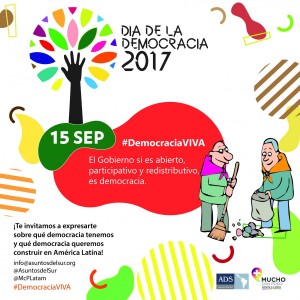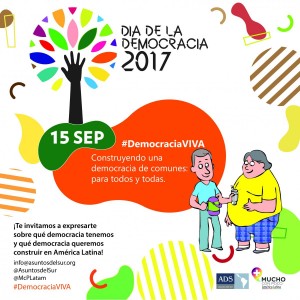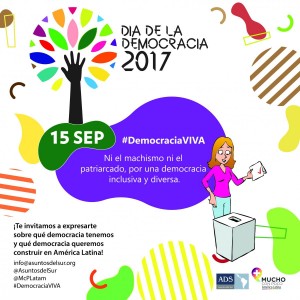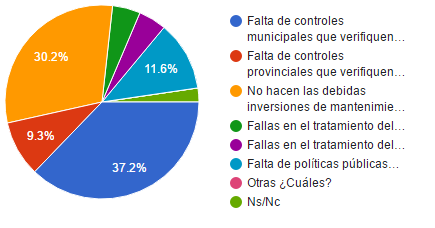“Below, we offer a google translate version of the original article in Spanish. This translation may not be accurate but serves as a general presentation of the article. For more accurate information, please switch to the Spanish version of the website. In addition, feel free to directly contact in English the person mentioned at the bottom of this article with regards to this topic”
The recent resolution officially ruled by the federal judge with electoral competence in Santa Fe, Reinaldo Rubén Rodríguez, who is challenging the list of 15 national deputy candidates, presented by the Ciudad Futura political space, is in debate. The magistrate ordered that Law 24,012 guaranteed equality of opportunity and treatment for women, which also has to be guaranteed for men. This statement generates an immediate question: What is the lack of access opportunities that men have in political spaces, in relation to women?
Unfortunately, in the wake of the interpretation of our Constitution, and in particular Art. 37, the provisions of the Convention on the Elimination of All Forms of Discrimination against Women (CEDAW) continue to be ignored. English), which enjoys a constitutional hierarchy and must be mandatory as a current and complementary norm of our Charter.
Article 4 (1) of the CEDAW states: “The adoption by States Parties of temporary special measures to accelerate de facto equality between men and women shall not be considered discrimination in the manner defined in the Convention. This Convention shall not, however, entail, as a consequence, the maintenance of unequal or separate standards; These measures shall cease when the objectives of equality of opportunity and treatment have been achieved”.
Female quota laws are nothing more than these “special temporary measures” established in this body of legislation, which must cease when the objectives of equality of opportunity and treatment have been achieved. From there comes the question: Have we already achieved such equality between men and women?
Recently, after the ruling in Santa Fe, some newspaper articles have branded Law No. 24,012 as “discriminatory for men.” But, although women are more than half the population, how is it possible that in no space for decision-making in our country we have reached 50% representation?
Gender inequality is manifest in all spaces, and the political is clearly included. Even more so when speeches that de-legitimize quota laws are tirelessly reproduced. Mandatory female representation by quota is the first step to ensure equal opportunities. Political parties must find female representatives, with sufficient qualifications and qualifications to fill these representative positions, so that they truly speak for women who are part of such spaces.
It is not the quota laws that compel the parties to make the candidates
the “wives of” or “figures of the spectacle or sport without vocation for politics and fictional candidates or testimonials who “smiles smiling”, as some notes Journalism. It is the machista mechanisms themselves that do not recognize women with sufficient autonomy and merit, as apt to occupy such positions of fundamental democratic importance.
It remains difficult to understand the debate around quota laws, when no alternative proposals have been heard or read that guarantee real spaces for women, who have historically been relegated to the private, far from politics. Let us not forget that it was only 69 years ago that women have acceded to the right to vote, and that Law 24,012 was enacted only in 1991.
Before the validity of the Act on Women, the women representatives of their parties in Congress did not exceed 6% of the total number of seats. After its promulgation, in 2005, the female participation reached 36% in the Chamber of Deputies and 42% in the Senate. At present, women occupy 41.7% in the Senate and 38.5% in Deputies.
The quota laws are necessary, and society and the Argentine political community remain indebted to democracy, because parity is not yet real. Let us not go back, and move forward to make room for equal opportunities and treatment between women and men.
Antes de la vigencia de la Ley de Cupo Femenino, las mujeres representantes de sus partidos en el Congreso no superaban el 6% del total de las bancas. Luego de su promulgación, en el año 2005, la participación femenina alcanzó el 36% en la Cámara de Diputados y el 42% en el Senado. En la actualidad, las mujeres ocupan el 41,7% en la Cámara de Senadores y el 38,5% en Diputados.
The quota laws are necessary, and society and the Argentine political community remain indebted to democracy, because parity is not yet real. Let us not go back, and move forward to make room for equal opportunities and treatment between women and men.
Sources
– Journalists and women politicians, a boom in list building. Editorial. Diario Clarin. Buenos Aires, 25/06/2017.
– Female quotas are not necessary. Editorial. Diario La Nacion. Buenos Aires, 09/07/2017.
– Gabriel Sued. Women unite in Congress for an increase in the female quota. Diario La Nación, Buenos Aires, 16/08/2016.
– Marcela Ríos Tobar. Woman and politics. The impact of gender quotas in Latin America. Catalonia. Santiago, Chile, 2008.
More information
Virginia Pedraza – vir.pedraza@fundeps.org







